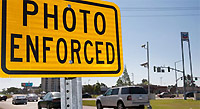The Collision Over Traffic
Cameras:
Time for some straight talk about
traffic safety from Lake City, City Manager Wendell
Johnson
 Lake
City, FL (Posted July 14, 2011 01:29 pm)
Lake
City, FL (Posted July 14, 2011 01:29 pm)
In the June 17th City Manager's Report, CM Johnson, instead of straight talk about traffic cameras in Lake City, spoke in bureaucratic mumbleez, only acknowledging after an inquiry by the Observer that he was indeed talking about traffic light cameras. At that time, CM Johnson reported he was looking into the situation and would possibly make a presentation to the City Council in July. This morning through his spokesperson, Joyce Bruner, it was reported, "He has not made a decision as of this date and is continuing to assess this matter." In the public interest, it's time for CM Johnson to ramp it up and get the conversation moving.
Under the leadership of Lake City's Mayor, Steve Witt, Lake City has been a "market place of ideas."
The Observer is moving the conversation along and hopes that the City Council encourages CM Johnson to do the same.
The Collision Over Traffic Cameras
By I Am Not A Rapper
Let's stipulate this upfront: Everybody hates motorists who run red lights or who speed recklessly.
Hence most people support those traffic cameras perched on roadsides in hundreds of municipalities all over the country, flashing retribution at offending drivers. Or shall we say, most people support them till they get a camera-generated ticket that they believe was issued unfairly.
“We’re certainly hearing varying tales around the country of how people feel about these cameras,” said Justin McNaull, the director of state relations for AAA, the automobile travel organization. “People are generally supportive of them. However, there is a fairly vocal minority that, for various reasons, doesn’t — whether those with concerns about Big Brother and government misuse of technology, or those who have gotten tickets that they simply don’t feel they should have got.”
And there’s the rub. I know or have heard from a good number of people who have never previously had a traffic citation, who one day open the mail and see their face on a ticket, say for a red-light violation they had no idea they committed, in a place they drove through months ago. Fines can run as high as $500 in some jurisdictions, with additional costs for mandatory attendance at safety classes. (And no, I have not had a ticket myself.)
The issue crops up increasingly with business travelers, especially those in rental cars. Typically, rental-car companies, which get the actual ticket, simply pay a summons and then bill the customer, who has little recourse.
Critics say that far too often, localities are using the systems — installed and managed by big corporate vendors that get a large chunk of the fine money — as just another way to generate revenue. They say some systems are rigged to cast a wider net that includes an ever-growing number of safe drivers whose violations, if any, would be overlooked by an actual police officer.
“Technology can absolutely help make roads safer, and red-light cameras and speed cameras, on properly engineered roadways, can play a proper role in that,” said Mr. McNaull, who is a former police officer in Arlington, Va. “The devil is really in the details as to how these things are implemented, so motorists are not being set up to fail.”
A reaction has been building, driven in large part by the growing number of people who feel they have been unfairly ticketed. Among the criticisms are that camera systems at some intersections, for example, have been calibrated to shorten the yellow-light interval to ensnare people who think they’re crossing prudently when the light suddenly goes red.
“We certainly have concerns that some jurisdictions view these cameras far more as revenue sources than as safety programs,” Mr. McNaull said.
A properly designed traffic camera system works in conjunction with good intersection engineering and basic common sense, “so you’re not going to ticket the person who miss times a light by four one-hundredths of a second,” he said.
Good intersection engineering mitigates the problem for a driver who is wondering, do I hit the brakes or not?” he said. “At properly designed intersections you shouldn’t have that dilemma zone, because there is ample yellow time for you to recognize that the light is changing,” Mr. McNaull said.
Redesigning accident-prone intersections costs lots of money, of course, at a time when localities are desperate. “In some parts of the country, proposals to initiate or expand automated enforcement have been put forward as part of the mayor’s budget package, and that causes real concerns,” Mr. McNaull said.
Last week, the Insurance Institute for Highway Safety, a trade group, released a survey stating that two-thirds of drivers in 14 big cities that use red-light cameras support the cameras, which the survey says have reduced fatal crashes significantly.
But others say the data used to claim significant road-crash reductions is often highly selective and misleading. Last fall, an audit by the Los Angeles city controller of the red-light cameras at 32 intersections found that the program “cannot conclusively demonstrate that it has reduced traffic collisions” and actually lost money for the city, once the private vendor was paid.
Around the country, voters have been supporting various initiatives to eliminate traffic cameras. In Houston, for example, voters last year approved a petition to remove traffic cameras that have generated more than $44 million in fines since 2004. However, a federal judge overturned that initiative on procedural grounds last month.
This debate is intensifying, and I’d like to hear from business travelers about their own experiences.
Photo credit: I Am Not A Rapper
Copyright 2011 I AM NOT A RAPPER - The complete article can be read here. Be advised that this is a rap - hip hop web site. Some folks may find the language in the songs offensive.
